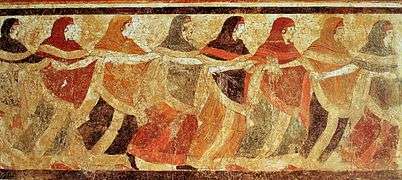Peucetians

The Peucetians (Ancient Greek: Πευκέτιοι Peukétioi; Latin: Peucetii) were a tribe who were living in Apulia, southern Italy, in the country of Peucetia around modern Bari. Other names are the Poedicli[1] and the Pediculans.[2] They are traditionally one of the three Iapygian tribes.[3] They had three important towns: Canosa, Silvium and Bitonto; the present capital of Apulia, Bari, had not much importance.
With increasing Hellenization their eponymous ancestor, given the name Peucetis, was said by Dionysius of Halicarnassus[4] to have been the son of the Arcadian Lycaon and brother of Oenotrus. Lycaon having divided Arcadia among his twenty-two sons, Peucetios was inspired to seek better fortune abroad. This etiological myth is considered by modern writers to suggest strongly that, as far as the Greeks were concerned, the Peucetii were culturally part, though an unimportant part, of Magna Graecia.
Strabo places them to the north of the Calabri.[5] Strabo adds (VI.8) "...the terms Peucetii and Daunii are not at all used by the native inhabitants except in the early times"In the time of Strabo the territory occupied by the former Peuceti lay on the mule-track that was the only connection between Brindisi and Benevento.[6] Pre-Roman ceramic evidence justifies Strabo's classification of Daunii, Peucetii and Messapii, who were all speakers of the Messapian language. There were twelve tribal proto-statelets among the Peucetii, one of which is represented by modern Altamura.
The Encyclopédie under "Peuceti", distinguishes them from another ancient people, the Peucetioe who were living in Liburnia at the head of the Adriatic, with a reference to Callimachus, as quoted in Pliny (H.N. III.21) placing their country in Pliny's day as part of Illyria[7] but modern ethnography treats them as synonyms.[8]
See also
References
- ↑ Strabo 1924, 6.3.1.
- ↑ Justin 1853, 12.2.
- ↑ Kathryn Lomas, "Cities, states and ethnic identity in southeast Italy" E. Herring and K. Lomas (eds), The Emergences of State Identities in Italy in the First Millennium BC (London, 2000).
- ↑ Dionysius, Roman Antiquites, I.xi.3.
- ↑ "...on the north [of the land of the Calabri], are the Peucetii and also those people who in the Greek language are called Dauni, but the natives give the name Apulia to the whole country that comes after that of the Calabri, though some of them, particularly the Peucetii, are called Poedicli also." (Geography VI.3).
- ↑ "There are two roads from here: one, a mule-road through the countries of the Peucetii (who are called Poedicli) the Dauni, and the Samnitae as far as Beneventum..." (Geography VI.7.
- ↑ on-line text
- ↑ i.e., Ray Laurence, in Cultural Identity in the Roman Empire, 1998, ch. 7 "Territory, ethnonyms and geography: The construction of identity in Roman Italy" "...in Apulia, where the Peucetii were also known as Poedicli..."
Sources
- Primary sources
- Justin (1853). Watson, John Selby, ed. Epitome of the Philippic History of Pompeius Trogus. London: Henry G. Bohn.
- Strabo (1924). Jones, H. L., ed. Geography. 3. Cambridge, Massachusetts: Harvard University Press. ISBN 978-0-674-99201-6.
External links
![]() Media related to Illyria & Illyrians at Wikimedia Commons
Media related to Illyria & Illyrians at Wikimedia Commons